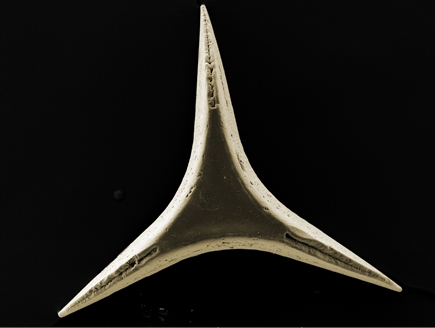Tiny skin-stabbing stars designed to get meds through the epidermis
Date: 2.10.2024
While topically-applied medications do help alleviate various skin conditions, they would be even more effective if they could better penetrate the skin's surface. Newly developed nanoceramic "stars" may one day help, by poking tiny holes in the skin.
 When medications are applied to the skin in the form of a lotion, the drug molecules are often large enough that they have difficulty passing through the skin's outer layer, called the epidermis. As a result, only a relatively small dosage is delivered beneath the skin's surface.
When medications are applied to the skin in the form of a lotion, the drug molecules are often large enough that they have difficulty passing through the skin's outer layer, called the epidermis. As a result, only a relatively small dosage is delivered beneath the skin's surface.
When it comes to treating skin maladies, however, microneedle patches have a couple of drawbacks as compared to lotions. For one thing, they're not conducive to treating large areas of skin. For another, they're difficult to apply to nooks and crannies, or any other location that isn't smooth and open.
That's where the nanoceramic stars come in. They're being developed by Michael Stuer, Patrick Hoffmann and colleagues at Switzerland's Empa research institute, in collaboration with Aldena Therapeutics as part of the StarCURE project.
Each three-dimensional three-armed star has a diameter of just 0.8 mm, and is currently made of aluminum oxide ceramic material (aka alumina). A laser sintering process was initially used to create each one individually, although the scientists have since produced polymer casting molds which would allow large numbers of the stars to be inexpensively manufactured on a commercial scale.
Batches of the tiny structures are added to a gel, along with a medication. The technology is particularly well-suited to drugs incorporating siRNA (small interfering RNA) molecules.
Image source: Empa.























